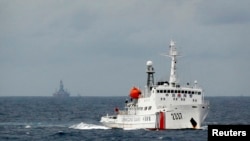The United States says it will closely observe the situation in the South China Sea to ensure steps are being taken to reduce tensions in the area.
The State Department released a statement one day after China dismissed a call by the U.S. for China to stop taking actions that it believes could increase tensions. The U.S. made the proposal at a meeting of the Association of South East Asian Nations -- or ASEAN. Secretary of State John Kerry called on ASEAN countries to manage territorial disputes based on international law. He said he is hopeful that tensions can be ended.
“We all underscored the importance of negotiations on a binding code of conduct. And I stressed the importance of everybody clarifying claims under international law and proceeding under the legal process through the law, through arbitration, and also through bilateral relationships.”
China and some Southeast Asian nations were not happy about the U.S. statement. China said by supporting countries like the Philippines and Vietnam, the U.S. was making the situation worse.
Efforts by the United States and the Philippines to persuade ASEAN members to support a temporary halt to oil drilling in disputed waters were unsuccessful. China said the U.S. was using the issue to interfere in the area.
In May, tensions in the South China Sea area rose sharply when China placed a huge oil-drilling rig in waters claimed by Vietnam.
Disagreement over the disputed sea has divided ASEAN. Several members have made territorial claims in the South China Sea. But they do not want to anger China.
In the past, China has been able to use its influence to block action on territorial issues. For example, talks ended without agreement when Cambodia chaired the ASEAN meeting in 2012. Cambodia is an ally of China.
I’m Anna Matteo.
This story was written in Special English by Mario Ritter from reports by the Reuters news agency and reporters Ron Corbin and Barry Newhouse in Bangkok. It was edited by Christopher Cruise.
______________________________________________________________
Words in the News
observe - v. to watch; to look at carefully; to celebrate or honor something
situation - n. the way things are during a period of time
dispute - v. to oppose strongly; dispute - n. an angry debate
negotiate - v. to talk about a problem or situation to find a common solution; negotiation - n. an act of negotiation, a formal discussion to reach an agreement
code - n. a set of laws or regulations
Now it’s your turn to use these words. In the comment section, write a sentence using one of these words and we will give you feedback on your use of vocabulary and grammar.






